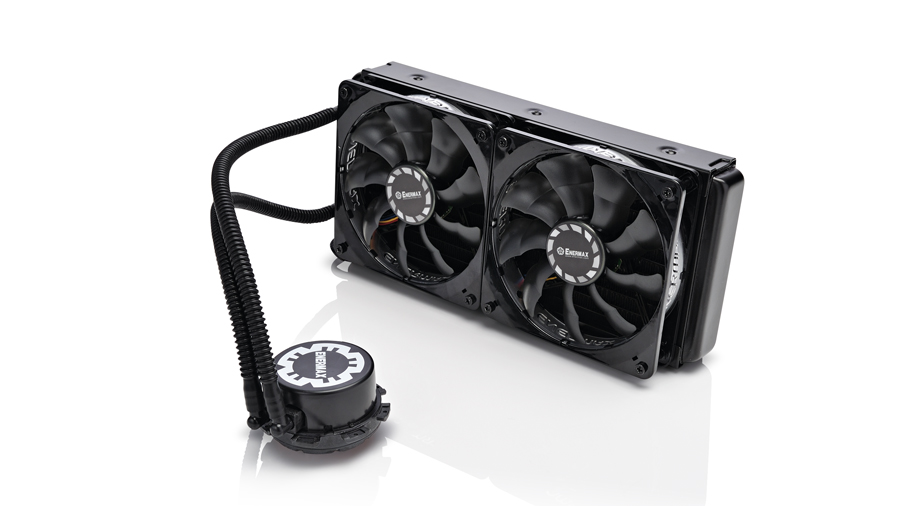TechRadar Verdict
Pros
- +
Good performance
- +
Silent mode works well
- +
Copes well with overclocking
Cons
- -
Some design quirks
- -
Not one for those who change CPUs
Why you can trust TechRadar
Sometimes the things that really get our dander up as hardware reviewers can be a distraction. They don't matter too much in the real world, but usually involve things that don't work well with our table-top test rigs, and make it painful to swap components around.
The Enermax ELC240 liquid cooling kit definitely falls into this camp. The design of its CPU cooler block fixtures and fittings makes it a pain if you decide to swap CPUs.
The problem is that the CPU backing plate isn't fixed to the motherboard with screw-on posts, so you always need access to the rear of the motherboard when swapping CPUs. This makes us furious - how important it is to you is another matter.
In reality, most rig builders will be setting up rigs that stay pretty stable in terms of the core components, and Enermax's design doesn't make that initial installation any harder. All the same, it's still a clumsy and unnecessary design niggle that pokes a stick in the ribs of our design OCD.
That aside, what do we make of the ELC240? It lines up neatly beside the Cooler Master Seidon 240M. Both are 240mm designs in terms of the main radiator, with a pair of 120mm air-pushers. Price wise, they're pretty close, too.
Building blocks
Surprisingly, the Enermax generally feels a bit clunkier. The aforementioned cooling block mounting issues aside, there's still no sound-dampening gasket for the fans. Another odd design decision involves the switches for the triple-level fan speed settings.
Unless we've misunderstood the manual, the preferred fitting configuration puts the switches out of reach behind the blades of the fans. It is possible to fit the fans reversed and thus expose the switches. In our testing there was no discernible difference in running temps in either config, and again, it seems likely that the vast majority of users will pick a setting and stick with it indefinitely. But choosing that setting in the first place is going to be a bit of a palaver if you have to remove the fans to change the speeds.
If this is all starting to sound a bit negative, the ELC240 does have some saving graces. It delivers generally more stable and, on occasion, slightly lower temps than the Cooler Master kit. What's more, with the fans set to silent mode, you lose almost no cooling performance. That's true even with our Intel Core i7-3770K test chip strung out all the way to 4.7GHz.
Benchmarks
Intel Core i7 3770K at standard clocks
CPU idle: Degrees centigrade: Lower is better
ENERMAX ELC240: 30
COOLER MASTER SEIDON 240M: 29
Intel Core i7 3770K at standard clocks
Full CPU load: Degrees centigrade: Lower is better
ENERMAX ELC240: 44
COOLER MASTER SEIDON 240M: 45
Intel Core i7 3770K overclocked to 4.7GHz
Full CPU load: Degrees centigrade: Lower is better
ENERMAX ELC240: 58
COOLER MASTER SEIDON 240M: 58
On the other hand, the maximum fan speed setting does seem rather redundant. It makes one hell of a racket and barely puts a dent in the CPU core temps. Of course, as with most motherboards, you'll be able to tweak fan speeds in the BIOS.
However, the Enermax's three-into-one power cable solution, though tidy, means you can only adjust fans and water pump together, so those physical speed switches on the fans are definitely worthwhile. The ELC240 works well once optimised and in situ. It's just not ideal if you're a compulsive fiddler who's constantly swapping CPUs.
Technology and cars. Increasingly the twain shall meet. Which is handy, because Jeremy (Twitter) is addicted to both. Long-time tech journalist, former editor of iCar magazine and incumbent car guru for T3 magazine, Jeremy reckons in-car technology is about to go thermonuclear. No, not exploding cars. That would be silly. And dangerous. But rather an explosive period of unprecedented innovation. Enjoy the ride.
